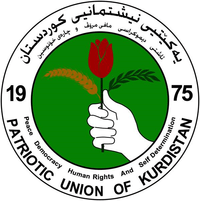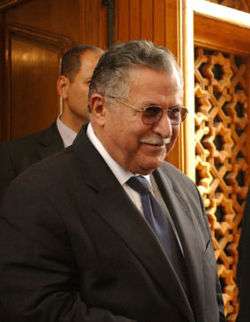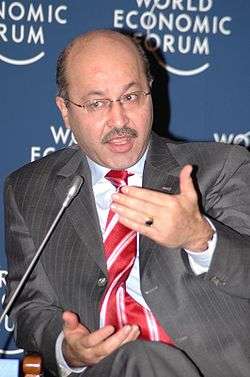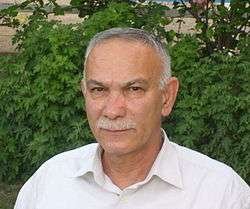Patriotic Union of Kurdistan
Patriotic Union of Kurdistan Yekêtiy Nîştimaniy Kurdistan یەکێتیی نیشتمانیی کوردستان | |
|---|---|
 | |
| Kurdish name |
Yekîtiya Nîştimanî ya Kurdistanê یهکیتیا نیشتمانی یا کوردستانێ |
| President | Jalal Talabani |
| Founder | Jalal Talabani |
| Founded | June 1, 1975 |
| Split from | Kurdistan Democratic Party |
| Headquarters | Silemani, Iraqi Kurdistan |
| Ideology |
Secularism Kurdish nationalism Social democracy Democratic socialism Civic nationalism |
| Political position | Centre-left |
| International affiliation |
Socialist International, Progressive Alliance |
| Colours | Medium sea green |
| Council of Representatives of Iraq |
21 / 328 |
| Kurdistan Parliament[2] |
18 / 111 |
| Party flag | |
 | |
| Website | |
|
www | |
The Patriotic Union of Kurdistan (PUK; Central Kurdish: یەکێتیی نیشتمانیی کوردستان, translit. Yekêtiy Niştîmaniy Kurdistan; Kurmanji: یهکیتیا نیشتمانی یا کوردستانێ, or: Yekîtiya Nîştimanî ya Kurdistanê; is a social democratic Kurdish political party in Iraqi Kurdistan.[3]
The PUK was founded on May 22, 1975, by coordination between Jalal Talabani, Nawshirwan Mustafa, Ali Askari, Fuad Masum, Adel Murad, and Abdul Razaq Faily. Talabani, a former student leader, lawyer, journalist and resistance leader, has been the Secretary General of the PUK since its founding in 1975. The Patriotic Union of Kurdistan describes its goals as self-determination, human rights, and democracy and peace for the Kurdish people of Kurdistan and Iraq. The current Deputy Secretary Generals are Kosrat Rasul Ali and Barham Salih. Fuad Masum, co-founder of the PUK, is the current President of Iraq.
History
Discontent within the Kurdistan Democratic Party (KDP)
The PUK traces its political heritage to Sulaymaniyah native Ibrahim Ahmad. After the collapse of the Soviet-backed Kurdish Mahabad Republic in Iran in early 1947, Ibrahim Ahmad, previously the Sulaymaniyah representative of the Iranian KDP (KDP-I), joined the newly formed Iraqi KDP. Ahmad was a highly influential leftist intellectual, who by 1951 had succeeded in rallying most of the Iraqi Kurdish leftist-nationalists to the new Iraqi KDP, which in turn, took the opportunity to convene a second Party Congress and duly elect Ahmad as secretary-general (effectively acting Chairman).[4]
However, from the very beginning in Iran, Ibrahim Ahmad's leftist politics, "intellectualism", and support for Qazi Muhammad put him at odds with the faction of the KDP loyal to Mustafa Barzani and his traditionalist-conservative tribal support base. It was "well-known in nationalist circles that the relations between the two men Mustafa and Qazi were not easy".[5] Ibrahim Ahmad was soon joined by up-and-coming intellectual and socialist Jalal Talabani. Barzani and Ahmad were known to dislike each other. But while each wanted to reduce the others' influence in the KDP, each also knew that the other was indispensable in securing the loyalty of their respective support-bases.[6]
When the first Ba'ath Party government was deposed in a coup led by Abdul Salam Arif, Mustafa developed a close relationship with Arif. Mulla Mustafa signed an agreement with Arif in his personal capacity, rather than as president of the KDP. This infuriated Ahmad and Jalal Talabani as the agreement omitted any mention of self-administration, let alone autonomy - the whole point for which the Kurds had been fighting a long-term guerrilla war. Arif threatened force against any Kurdish opponent of Mustafa, while Mustafa declared that any resistance to Baghdad would constitute a declaration of war against himself and the Barzanis.[7]
Ibrahim Ahmad and Jalal Talabani decried this complicity, and as they saw it, submission, to Baghdad. Mulla Mustafa rallied the conservatives and tribal leaders to his side. Furious debates and campaigning followed, but Ahmad's and Talabani's arguments could not dislodge Mulla Mustafa's position as the popular figurehead of the Kurdish people. Mulla Mustafa would accept not dissent, and, fearing for their lives, Ahmad and his followers slipped away at night from a heated discussion with Mulla Mustafa, and retreated back to their stronghold in Mawat, Iraq.[8]
At the 6th Party Congress of the KDP in July 1964, representatives from the Ahmad-Talabani faction were promptly arrested upon arrival. A few days later Mulla Mustafa sent his son, Idris Barzani with a large force to drive Ahmad, Talabani, and their 4,000 or so followers into exile in Iran. With that, Mulla Mustafa had finally achieved undisputed control of the KDP.[8]
Founding of the Party



After the defeat of the Kurds in the 1974–1975 Revolt, on May 22, 1975, Talabani met in a coffee shop called Gligla, in Aum Rmana, Damascus, with Fuad Mausm, Adel Murad, and Abdul Razaq Faily. On 22, May 1975 the PUK announced its formation via Syrian and Lebanese Media. The day after, Talabani visited West Germany Berlin and met three other co-founders Nawshirwan Mustafa, Omar Shekhmus, and Kamal Fwad, and some other activist. On June 1, 1975 the PUK was announced again in Berlin, and thus it was decided that June, 1 is the anniversary date of the founding of the Patriotic Union of Kurdistan (PUK).
The PUK was a coalition of at least five separate political entities, the most significant of which were Talabani and his closest followers, Nawshirwan Mustafa's clandestine Marxist-Leninist group Komala, and the Kurdistan Socialist Movement (KSM), led by Ali Askari. The PUK served as an umbrella organization unifying various trends within the Kurdish political movement in Iraq.
In 1992, the constituent groups within the PUK merged into a unified political movement that affirmed its social-democratic identity and affiliation. Their communique ascribed the collapse of the revolt to "the inability of the feudalist, tribalist, bourgeois rightist and capitulationist Kurdish leadership".
The PUK received grass roots support from the urban intellectual classes of Iraqi Kurdistan upon its establishment, partly due to 5 of its 7 founding members being PhD holders and academics. In the early 1980s the PUK evolved and broadened its appeal to all sections of Kurdish society especially the rural classes. The regional Kurdish assembly elections showed that the PUK's support lies predominantly in the southern area of Iraqi Kurdistan.
Since the first Gulf War, the PUK has jointly administered Iraqi Kurdistan with the Kurdistan Democratic Party (KDP). However, in 1994 the parties engaged in a three-year conflict, known as the Kurdish Iraqi Civil War. The conflict ended with US mediation, and reconciliation was eventually achieved.
In Sep 2001, the Islamist group Jund al-Islam (the Army of Islam) massacred 43 PUK members.[9]
In 2006 the PUK, became a member of the Socialist International and Talabani is a vice president of the organisation. The last party congress was held in June 2010, where a new politburo and leadership council was elected.
Structure
The Leadership Council elects the Secretary General and the 11 member Political Bureau. The PUK has 36 branches throughout Iraqi Kurdistan and draws membership from a broad cross-section of Kurdish society. The membership of the PUK, based on statistics compiled in September 1998, stands at 800,280 members and associates. The PUK contested the 1992 elections for the Kurdistan National Assembly, and the party list acquired 423,682 votes of the total of 957,469 valid votes cast - giving the PUK commanding majority in three of Iraqi Kurdistan four provinces.
Organizational structure
The PUK's structure consist of 8 bureaus:
- Bureau for Organization: Manages PUK's organizations throughout the region, as well as producing and disseminating educational and informational materials for distribution to the membership. The bureau also supervises the electoral process within the organization and ensures that the party adheres to its bylaws.
- Bureau for Information: Supervises and manages PUK media operations. Currently, the PUK operates several outlets:
- The People of Kurdistan TV (Gali Kurdistan) (based in Sulaymaniyah), the main television station, and other smaller TV stations in the towns and districts of the region;
- The Voice of the People of Kurdistan, a radio station that broadcasts in Kurdish and Arabic. The transmission is received throughout the Middle East and Europe.
- Kurdistan-i-Nwe, a daily Kurdish newspaper, the Al-Itihad weekly in Arabic, and The Monitor, a daily bulletin in Kurdish and Arabic, which monitors international broadcasts on matters relating to Kurdish and Iraqi affairs;
- Bureau for Culture and Democratic Organization: Acts as a liaison with professional and cultural organizations such as the Students' Union of Kurdistan, Women's' League of Kurdistan, and the Writer's Association.
- Bureau of Finance and Management: Manages the financial affairs and administrative staff of the organization. The Leadership Council, through an independent Auditing Commission, supervises the activities of this bureau.
- Bureau for Human Rights: The bureau was instituted to monitor the human rights situation in Iraqi Kurdistan - with primary emphasis on the conduct of PUK members and leadership. The bureau acts as a liaison with local human rights organizations and engages in a wide range of educational campaigns with regard to human rights principles, the rule of law, and democracy and to ensure PUK's adherence to the Universal Declaration of Human Rights. The bureau reports directly to the PUK Secretary General.
- Bureau for Social Affairs: In conjunction with the regional authorities, the bureau facilitates settlement of social disputes, particularly with regard to land and tribal matters.
- Bureau for Martyr's and Veteran Affairs: The bureau is tasked with assisting the families and dependents of victims of the war in Kurdistan and the veteran community.
- Bureau for International Relations: The bureau of international relations coordinates the activities of PUK representatives abroad and reports to PUK's political leadership on relations with foreign government and institutions. Today, PUK has permanent offices in Washington, London, Paris, Berlin, Moscow, Rome, Stockholm and Brussels, the seat of the European Parliament. In the Middle East, the PUK has offices in Tehran, Ankara, Syria and Egypt.
Iraqi Kurdistan legislative election, 2009
The PUK lost its stronghold city, Sulaymaniyah in the Iraqi Kurdistan legislative election of 2009. The main reason is believed by observers to be because of the accusation of alleged widespread corruption and centralization of decision making inside the structure of PUK. The formation of a new list, the Change List, that was formed by Nawshirwan Mustafa, a former PUK member, won the majority of the votes in Sulaymaniyah by 51%.
Notable members
- Fuad Masum, former Prime Minister of the Kurdistan Regional Government and current President of Iraq.
- Jalal Talabani, former President of Iraq.
- Kosrat Rasul Ali, Vice President of Iraqi Kurdistan.
- Najmaldin Karim, Governor of Kirkuk Province.
- Mala Bakhtiar, Chief of Executive Body of Patriotic Union of Kurdistan Political Bureau
- Ali Askari, founding member of the PUK and prominent politician that was later killed in action.
- Nawshirwan Mustafa, founding member that resigned and founded the Change List.
- Latif Rashid, former spokesperson in the United Kingdom.
- Barham Salih, former prime minister of the Kurdistan Regional Government and former Deputy prime minister of Iraq.
- Najmadin Shukr Rauf, prominent member of the Peshmerga that was killed in action.
- Adel Murad, General Secretary of PUKCC.
- Ibrahim Ahmad, influential Kurdish novelist.
- Omer Fattah Hussain, former deputy prime minister of the Kurdistan Regional Government.
- Shahab Sheikh Nuri, influential Kurdish politician.
- Sabah Sabir, former representative in the UK.
References
- ↑ Includes six seats from the KDP-led Kurdistan Alliance in the Nineveh Governorate
- ↑ Part of the Kurdistan List
- ↑ Patriotic Union of Kurdistan - Official Website
- ↑ McDowall, David. A Modern History of the Kurds. London: I.B. Tauris, 2007 ed. p. 297
- ↑ McDowall, David. A Modern History of the Kurds. London: I.B. Tauris, 2007 ed. p. 242
- ↑ McDowall, David. A Modern History of the Kurds. London: I.B. Tauris, 2007
- ↑ McDowall, David. A Modern History of the Kurds. London: I.B. Tauris, 2007 ed. p. 316
- 1 2 McDowall, David. A Modern History of the Kurds. London: I.B. Tauris, 2007 ed. p. 317
- ↑ Rubin, Michael (May 2002). "The Afghan Aftermath in the Middle East". Retrieved 21 Apr 2014.